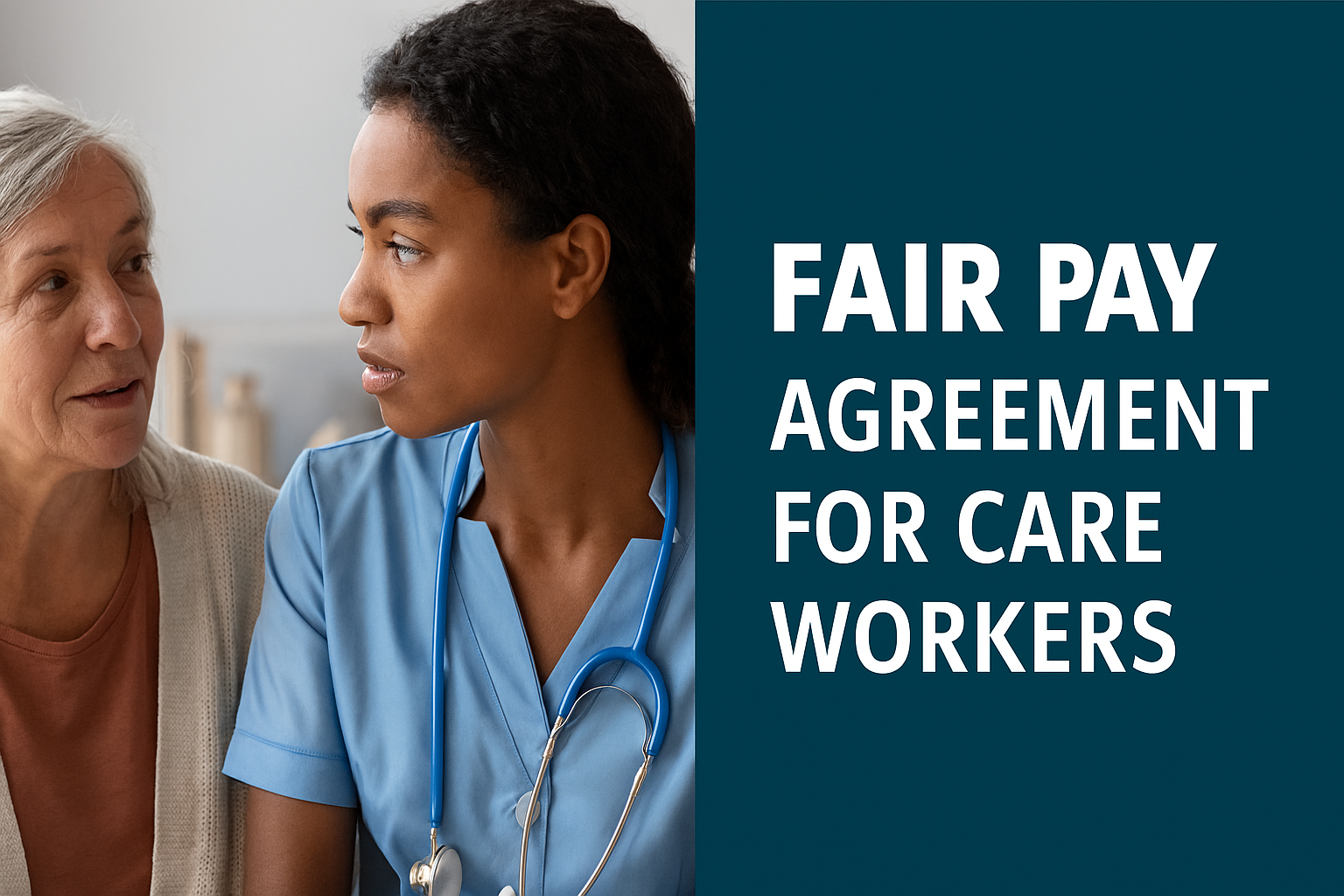The government has announced £500 million funding for the first-ever Fair Pay Agreement for care workers. According to the government announcement, this initiative aims to improve pay and working conditions across the social care sector.
The announcement indicates that the Fair Pay Agreement will establish standards for care worker compensation, though specific details about implementation and requirements are not provided in the government statement.
💰 Fair Pay Agreement Highlights
- £500 million government investment in the first-ever Fair Pay Agreement
- Comprehensive reform of pay and conditions across the social care sector
- Minimum standards framework for wages, terms, and working conditions
- Recognition of care workers as essential service providers
- Coordinated approach to addressing sector-wide employment issues
Government Announcement Details
Based on the government announcement, the Fair Pay Agreement represents a coordinated approach to addressing care worker compensation. The announcement provides specific details about the initiative's scope and supporting measures.
The £500 million funding allocation is part of a broader package of social care investments, representing a significant government commitment to improving conditions across the sector.
Public Consultation Process
According to the government announcement, a public consultation has been launched alongside the funding announcement to gather views on the design of the Fair Pay Agreement process. This consultation aims to inform how the agreement will be structured and implemented across the social care sector.
The consultation approach suggests the government is seeking input from stakeholders including care providers, workers, unions, and other interested parties before finalizing the agreement framework.
Immediate Sector Support Measures
The government announcement indicates that the Fair Pay Agreement funding follows immediate actions already taken to boost the social care sector, including:
- Carers' Allowance Uplift: £2,000 increase in carers' allowance to support those providing unpaid care
- Disabled Facilities Grant Enhancement: Increased funding to provide 15,000 additional home adaptations for disabled people
Legal Framework and Employment Rights
According to the announcement, the Fair Pay Agreement will be backed by law currently progressing through Parliament via the Employment Rights Bill. This legal framework will empower employers and unions to negotiate better terms and conditions for care workers.
The Employment Rights Bill connection indicates the Fair Pay Agreement is part of broader employment law reforms designed to strengthen worker rights and collective bargaining across multiple sectors.
Broader Funding Context
The government announcement positions today's funding within the context of the recent Spending Review settlement, which included:
- Local Government Funding: 2.6% real terms average annual increase in local government core spending power over the Spending Review period
- Grant Funding: £3.4 billion of new grant funding allocated for vital local services
- Adult Social Care Investment: The £500 million forms part of over £4 billion of additional funding available for adult social care in 2028-29, compared to 2025-26
Social Care Sector Context
The announcement comes within the context of a social care sector that has faced challenges including staff shortages and recruitment difficulties. Care work is essential for supporting elderly people, those with disabilities, and other vulnerable groups.
Improving pay and working conditions in social care has been identified as important for workforce stability and service quality, though the specific impact of this agreement remains to be determined.
Information Provided
The government announcement specifies:
- £500 million funding for the first-ever Fair Pay Agreement
- Public consultation launched to gather views on agreement design
- Legal backing through the Employment Rights Bill currently in Parliament
- Employer and union negotiation framework for better terms and conditions
- £2,000 carers' allowance uplift as immediate sector support
- 15,000 additional home adaptations through increased Disabled Facilities Grant
- 2.6% real terms increase in local government core spending power
- £3.4 billion new grant funding for vital local services
- Over £4 billion additional adult social care funding by 2028-29
Information Not Provided
The government announcement does not specify:
- Specific minimum pay rates or wage scales under the agreement
- Timeline for public consultation completion and next steps
- Detailed implementation timeline following consultation results
- How the £500 million funding will be distributed among providers
- Enforcement mechanisms for agreement standards once implemented
- Integration with existing local authority care commissioning arrangements
- Specific terms and conditions to be negotiated under the framework
- Expected timeline for Employment Rights Bill passage
- Regional rollout strategy or pilot programs
- Success metrics or evaluation criteria for the agreement
Limited Implementation Details
While the government announcement indicates collaborative working with sector stakeholders, specific details about implementation processes, timelines, and practical arrangements are not provided in the statement.
The brief nature of the announcement means many questions about how the Fair Pay Agreement will work in practice remain unanswered pending further government communications.
Looking Forward
The government's announcement of £500 million for a Fair Pay Agreement, supported by public consultation and legal framework through the Employment Rights Bill, represents a comprehensive approach to social care reform.
The broader funding context, including over £4 billion additional adult social care funding by 2028-29 and immediate support measures like the carers' allowance uplift, suggests sustained government commitment to sector transformation.
The success of this initiative will depend on effective consultation outcomes, timely passage of the Employment Rights Bill, and practical implementation arrangements that balance improved worker conditions with sustainable service delivery and funding distribution.
